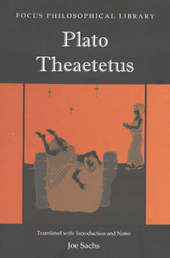
|
Theaetetus
Paperback / softback
Main Details
Description
This is an English translation of Plato's dialogue concerning the nature of knowledge. In this dialogue, Socrates and Theaetetus discuss three definitions of knowledge: knowledge as nothing but perception, as true judgment and as true judgment with an account. Focus Philosophical Library translations are close to and are non-interpretative of the original text, with the notes and a glossary intending to provide the reader with some sense of the terms and the concepts as they were understood by Plato's immediate audience.
Author Biography
Joe Sachs taught for thirty years at St. John's College in Annapolis, Maryland. He has translated Aristotle's "Physics," "Metaphysics" and "On the Soul" and, for the Focus Philosophical Library, Aristotle's "Nicomachean Ethics" and "Poetics", and Plato's "Theaetetus" and "Republic."
ReviewsSachs's outstanding new translation of Plato's Theaetetus is lucid, readable, and faithful to the original. More than that, it is a translation for the thoughtful reader. Through his striking translations of key terms, Sachs compels the reader to think more deeply about Plato's intent. He shows that Plato's return within the dialogue to the same word or to its cognates is no accident but signals a philosophical trope in Plato's thought. The work's introduction avoids presenting a stock summary of the topics covered or a rehearsal of the failed arguments. Instead, it makes the case for regarding the Theaetetus as Plato's 'missing' work on The Philosopher. Through the 'variety of attempts, errors, new beginnings, and false turns that the dialogue presents,' Sachs argues, Socrates provokes his interlocutors and Plato's readers to strive to cross the boundary between mere opinion and the kind of thinking that is philosophy. -- Roslyn Weiss, Lehigh University
|